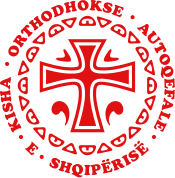Albanian Orthodox Church
| Autocephalous Orthodox Church of Albania Kisha Ortodokse Autoqefale e Shqipërisë |
|
|---|---|

Seal
|
|
| Founder |
Apostle Paul Theofan Stilian Noli |
| Independence | 17 September 1922 |
| Recognition | recognised in 1937 by the Ecumenical Patriarchate of Constantinople. |
| Primate | Archbishop Anastasios of Albania |
| Headquarters | Resurrection Cathedral, Tirana, Albania |
| Territory | Albania and Albanian diaspora |
| Possessions | — |
| Language |
Albanian (Greek,Macedonian and other languages can be used for all those who are used to have their liturgy in other languages, with the condition that the liturgy text is approved by OACA) |
| Members | 500,000-700,000-800,000 (claimed), number much higher when diaspora is considered. |
| Bishops | 6 |
| Priests | 135 |
| Parishes | 909 |
| Monasteries | 150 |
| Website | http://www.orthodoxalbania.org/ |
The Autocephalous Orthodox Church of Albania (Albanian: Kisha Ortodokse Autoqefale e Shqipërisë) is one of the newest Eastern Orthodox churches. It declared its autocephaly in 1922 through its Congress of 1922, and gained recognition from the Patriarch of Constantinople in 1937.
The church suffered during the Second World War, and in the communist period that followed, especially after 1967 when Albania was declared an atheist state, and no public or private expression of religion was allowed.
The church has, however, seen a revival since religious freedom was restored in 1991, with more than 250 churches rebuilt or restored, and more than 100 clergy being ordained. It has 909 parishes spread all around Albania, and around 500,000 to 550,000 (unconfirmed) faithful. The number is claimed to be as high as 700,000 by some Orthodox sources – and higher when considering the Albanian diaspora.
The Holy Synod of Bishops was established in 1998, and is currently composed of:
Christianity first arrived in Albania with Saint Paul during the 1st century. Saint Paul wrote that he preached in the Roman province of Illyricum, and legend holds that he visited Durrës. However it was with Constantine the Great, who issued the Edict of Milan and legalized Christianity, that the Christian religion became official in the lands of modern Albania.
When Albania came under Ottoman influence in the 15th century the Orthodox people of Albania were members of the Archbishopric of Ohrid which was officially recognized by the Ottoman Empire. Following the Ottoman conquest in the 15th century, a slow conversion of Albanians to Islam started. By mid-19th century, because of the Tanzimat reforms started in 1839, which imposed mandatory military service on non-Muslims, the majority of Albanians had become Muslim.
...
Wikipedia
